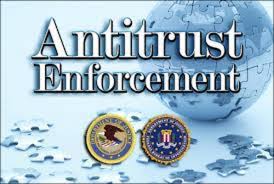DOJ’s Antitrust Division Announces New Policy for Crediting Corporate Compliance Programs (Part I of II)

In yet another major compliance development, the Justice Department announced the adoption of a new policy to credit effective compliance programs in resolving criminal cartel prosecutions against corporations. Since the 1990s, the Antitrust Division’s policy regarding corporate compliance programs was generally fixed given the ability of companies to seek benefits under the leniency program. In this respect, the first reporting company would earn immunity and a de-trebling of civil liability for antitrust cartel conduct.
As part of its new policy, the Antitrust Division released its own guidance for the Evaluation of Corporate Compliance Programs (Here). This new document complements the recent guidance issued by the Criminal Division (Here). As a result, companies facing criminal prosecution in the United States can now seek credit for their respective compliance programs, whether cartel, FCPA, fraud or other conduct.
The Antitrust Division’s new policy was announced by Assistant Attorney General Makan Delrahim in a speech last week (Here). The announcement is the culmination of a lengthy process, which included a public roundtable with antitrust practitioners, coordination with global cartel enforcement authorities, and an internal DOJ review.

Under the existing Corporate Leniency Policy, companies that cooperate after the initial reporting company were generally required to plead guilty to a criminal charge with an opportunity to receive a penalty reduction for timely, significant and useful cooperation. AAG Delrahim explained that this all-or-nothing approach was intended to incentivize early reporting in order to secure first-in status.
To improve the incentive structure, the Antitrust Division will now: (1) credit compliance programs at the charging stage; (2) clarify its approach to evaluating effectiveness of compliance programs at the charging stage; and (3) release a public guidance document for the evaluation of compliance programs.
The Antitrust Division reiterated its primary objective to deter criminal cartels and focus its efforts on the prosecution and punishment of individual offenders. At the same time, the Antitrust Division intends to incentivize corporate compliance programs to detect and prevent as the first line of defense against corporate misconduct.
The Antitrust Division embraced the four important prongs of corporate citizenship under the Justice Manual’s Principles of Federal Prosecutions of Business Organizations: (1) robust and effective compliance programs; (2) prompt self-reporting when misconduct occurs; (3) cooperation in any investigation; and (4) remedial actions. When all four of these principles are met, a company should be rewarded and credited. The Antitrust Division’s policy is aimed at encouraging investment in compliance programs in the first place and incentivize others to do the same.
The Antitrust Division’s Evaluation of Corporate compliance Programs will be implemented at the time of determination of a charging decision – whether to require a company to plead guilty, or enter a Deferred Prosecution Agreement (DPA). The Antitrust Division, however, will continue to disfavor non-prosecution agreements (NPAs) with companies that do not receive leniency because such a benefit is only available to the first to report company.

Under the new policy, a compliance program will not guarantee a DPA. Such a determination will require a fact-specific inquiry into “whether the program at issue is adequately designed for maximum effectiveness in preventing and detecting wrongdoing by employees,” and will be considered together with other relevant factors.
The Antitrust Division will continue to apply its successful Corporate Leniency Program, which has been in place since the early 1990s, and rewards the first corporation to make a full disclosure of criminal conduct to the government.
The new compliance program credit policy also will apply at sentencing proceedings. Under the existing Sentencing Guidelines, a company can earn a three-point reduction in its culpability score if the company has an “effective” compliance program. Second, a compliance program may be relevant to deter mining the appropriate corporate fine to recommend within the guidelines range, or even below the range in extraordinary circumstances. And third, the existence of a compliance program is relevant to the government’s recommendation on probation. In most cases, the Division has recommended against imposing probation on a corporate defendant.
The Division may recommend an external monitor in egregious cases where: (1) the company fails to improve its compliance program and corporate culture; (2) the company refuses to implement an adequate compliance program or implements a grossly inadequate antitrust compliance program; and (3) the company is a repeat offender.
















1 Response
[…] Programs? Mike Volkov takes a deep dive in a two part series on Corruption Crime and Compliance. (Part 1and Part […]